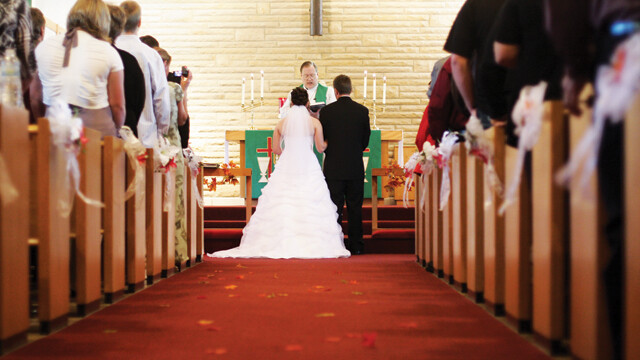3 different kinds of people can conduct your ceremony
V1 Staff |

The question “Who can conduct the ceremony?” is actually more complicated than you might think. Generally speaking, there are three different kinds of people who can do the hitching.
Clergy Member
If you go the traditional marriage route as a member of an established church or other religious entity, your minister, priest, rabbi, pastor, or other holy person can do the honors and sign the certificate.
Things get a big more complicated when the religious officiant is from out of state; in that case, he or she needs a letter of sponsorship from an in-state church or denomination. And they get even more complicated if your religious officiant is nontraditional (for example, if he or she got ordained over the Internet). As the Eau Claire County Clerk’s office notes, there’s no statewide registration system for religious officiants, so it’s up for the couple to figure out if their officiant is legit. (Consulting with a lawyer may be necessary.)
“Common sense needs to be exercised by the nontraditional marriage officiants,” the state Vital Records Office states in a memo to prospective brides and grooms. “They need to understand they are completing a legal document and it will be with you, the couple, the rest of your lives.”
Civil Officiant
If you’re not interested in the religious route, you can be married by any judge (including a municipal court judge, a reserve judge, or a tribal judge) as well as by a court commissioner or family court commissioner. And if you’d like your ceremony to be imbued with all the romance the Eau Claire County Courthouse provides, contact family court commission Nathan Novak at (715) 839-6029.
Yourself
(Well, maybe.) In certain circumstances, a bride and groom can legally marry themselves – no need for a minister, judge, or anyone else in a robe. Under state law, a couple can do so “by mutual declarations that they take each other as husband and wife, in accordance with the customs, rules and regulations of any religious society, denomination or sect to which either of the parties may belong.”
This is where it gets tricky: In an informational sheet, the Eau Claire County Clerk’s office notes that “there are very few religions or sects that allow this option.” And while no one will demand proof that a bride or groom belong to such a sect, the office reminds them that “it is illegal to provide false information in order to claim coverage under this provision.” In other words, be careful if you’re considering this unusual approach.




















